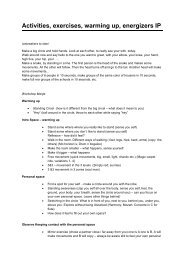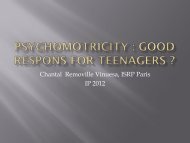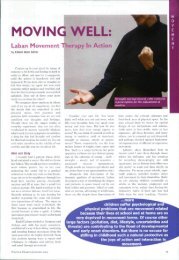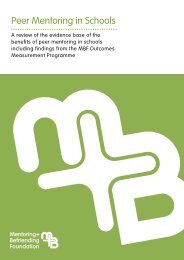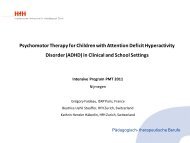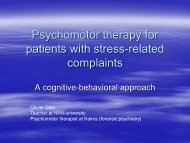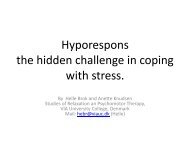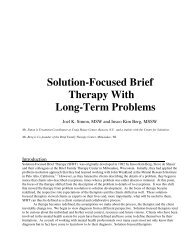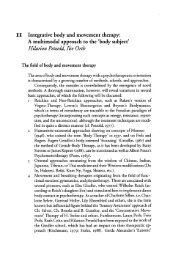Factors and Processes Contributing to Resilience
Factors and Processes Contributing to Resilience
Factors and Processes Contributing to Resilience
You also want an ePaper? Increase the reach of your titles
YUMPU automatically turns print PDFs into web optimized ePapers that Google loves.
II<br />
116 Karol L. Kumpfer<br />
B<strong>and</strong>ura, A. (1989). Human agency in social cognitive theory. American Psychologist, 44(9),<br />
1175-1184.<br />
Barbarin, 0. (1993). Coping <strong>and</strong> <strong>Resilience</strong>: El(ploring the inner Jives of African-American<br />
Children. Journal of 8/ack Psychology.<br />
Barnes, G. M., & Welle, J. W. (1986). Patterns<strong>and</strong> predic<strong>to</strong>rs of alcohol use among 7-12th grade<br />
students in New York State. Journal of Studies on Alcohol, 47,53-62.<br />
Beardslee, W. R. (1983). Commitment <strong>and</strong> endurance: A study of civil righls workers who<br />
stayed. American Journal of Orthopsychiatry, 53, 34-42.<br />
Beardslee, W. R. (1989). The role of self-underst<strong>and</strong>ing in resilient individuals: The development<br />
of a perspective. American Journal of Orclwpsychiatry, 59(2), 266-278.<br />
Beardslee, W. R., & Podorefsky, 0. (1988). Resilient adolescents whose parcnts have serious<br />
psychiatric disorders: Importance of self-underst<strong>and</strong>ing <strong>and</strong> relationships. American<br />
Journal of Psyclaiatry, 145(1}, 63-69.<br />
Bennett, L. A., Wolin, S. J., Re iss, 0., & Thilelbaum, M. A. (198J). Coupfes at risk for alcoholism<br />
transmission: Proteelive inHuences. Family Process, 26, 111-129.<br />
Berlin, R., & Oavis, R. B. ( 1989). Children from alcoholic families: Vulnerability <strong>and</strong> resilience.<br />
In 1imothy F. Dugan <strong>and</strong> Robert Coles (Eds.), The Child in Our Times: Studies in the<br />
Development of Resiliency (pp. 81-105). New York: Brunner/Mazel.<br />
Benard, B. (1991 ). Fastering resilience in kids: Proteelive fac<strong>to</strong>rs in fami/y, schoo/, <strong>and</strong> community.<br />
San Francisco: Western Center for Orug-free Schools <strong>and</strong> Communities,August 1991.<br />
Benard, B. (1993, Aprii).{Oiscussion du ring conference on "Pulling Resiliency in<strong>to</strong> Substance<br />
Abuse Prevention for Adolescents."J Unpublished prcsentation, New York.<br />
Berndt, T., & Ladd, G. ( 1989). Peer Relationships in Child Developmem, New York: John Wiley<br />
& Sons (Ed.).<br />
Biglan, A., Severson, H. H., Ary, 0. V., Faller, C., Thompson, R., Nautel, C., Lichtenstein, E., &<br />
Weissman, W. W. (1985). Refusal skills training <strong>and</strong> thc prevention of adolescent cigarette<br />
smoking. Preventative Medicine, 11, 199-2 t 1.<br />
Bleuler, M. (1984). Different forms of childhood stress <strong>and</strong> pattcrns of adult psychiatric<br />
outcome. In N. F. Watt, E. J. Anthony, & J. E. Rolf (Eds.). Clzildretr at risk for schizophrenia<br />
(pp. 537- 542}. Cambridge: Cambridge University Press.<br />
Block, J. H., & Block, J. ( 1980). The role of ego-control <strong>and</strong> ego-resiliency in the organization<br />
of behavior. ln W. A. Collins (Ed.), Developmenc of cogtrition, affect, <strong>and</strong> social relations:<br />
The Minnesota Symposia on Child Psycho/ogy, 13, 39-lOl. Hillsdale, NJ: Lawrence<br />
Erlbaum Associates.<br />
Botvin, G. J., Baker, E., Dusenbury, L., Tortu, S. , & Botvin, E. M. (1990). Preventing adolescent<br />
drug use through a multimodal cognitive-behavioral approach: Results of a 3-year<br />
study. Journal of Consulting <strong>and</strong> Clinica/ Psycho/ogy, 58, 437-446.<br />
Botvin, G. J., Baker, E., Filazzola, A. 0., & Botvin, E. M. (1990). A Cognitive-Behavioral<br />
Approach <strong>to</strong> Substance Abusc Prevention: One-year follow-up. Addictive Behaviors, 15,<br />
47-63.<br />
Botvin, G. J., & Tortu, S. (1988). Peer relationships, social competence, <strong>and</strong> substance abuse<br />
· prevention: Implications for the family.Journal of Social Work und Human Sexuality, 6(2),<br />
105-119.<br />
Botvin, G. 1., Baker, E., Renick, N. L., Filazzola, A. 0., & Botvin, E . M. (1984). A cognitive<br />
behavioral approach <strong>to</strong> substance abuse prevcntion. Addictive Behaviors, 9, 137- 147.<br />
Bronfenbrenner, U. (1986). Ecology of the family as a context for human development:<br />
Research pcrspectives. Developmenta/ Psyclaology, 22,723- 742.<br />
Bronfenbrenner, U., & Crouter, A. C. (1983}. The evolution of environmental models in developmental<br />
research. ln P. 1-1. Mussen (Ed.), H<strong>and</strong>book of child psychology (4th edition).<br />
New York: Wiley.



